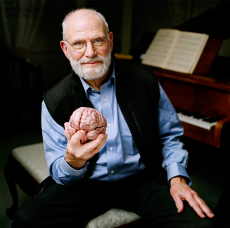
The late Oliver Sacks, an extremely influential neurologist, presents perhaps some of most persuasive evidence for neuroplasticity in his work, ‘Musicophilia.’ He recounts a patient, ‘Jacob L.,’ a composer, who was afflicted with an unusual and sudden case of sound distortion and hearing loss. Sacks was astounded to see that for the duration of Jacob L.’s problems, he had been continuously making ‘accommodations,’ working out certain melodies in the higher register (where the distortion seemed to affect) on the keyboard, but in a lower range than where the distortion was occurring, then subsequently transposing these notes to the desired key. He was able to perform this cumbersome task due to the fact that he was inherently aware of how his music ‘should sound.’ Thus, it became clear that it was his ‘perception of music that was distorted,’ (Sacks, 2007).
Sacks and Jacob L. eventually established the route cause to be ‘Cochlear Amusia,’ but the diagnosis did not hinder Jacob L. He continued working around his neurological defect, employing strategies to create music as he knew it ‘should’ sound, i.e through transposing. As such, ‘he could fight against the distortions, using the brain’s power and plasticity to compensate,’ (Sacks, 2007). Sacks went on to note his ‘wonder’ at this display of neuroplasticity; ‘that through intensive musical activity, attention, and will, Jacob’s brain has literally reshaped itself.’
As Sacks himself saw, there is no contesting that idea that the brain can substantially alter its structure to compensate for deficiencies and traumas. Therefore, I would argue that this demonstrates a full potential for musical therapy; music as a form of medicine. It seems that through persistent musical activity, the brain can adapt and ‘reshape’ itself so as to essentially ‘cure’ itself of a neurological problem. Indeed, this was an individual case, but it undeniably shows a lot of promise for the power of music and its impact upon plasticity. Therefore, I believe music has a lot of potential to help those with other neurological and physiological issues, especially as Jacob L. was in his ‘late sixties’ at the time. This means music could provide treatment prospects to the ageing population, and just the young who naturally have more adaptable brains. This is such an important discovery, as there is a rising number of the population affected by neurodegenerative diseases such as Alzheimer’s, and yet, we are yet to find a cure. It would be somewhat rash to declare that this could be a ‘cure,’ but rather, it should certainly be explored with the prospects of maintaining brain functions and possibly improving them, so as to help people sustain a quality of life for as long as possible.
image:http://www.oliversacks.com/about-oliver-sacks/

0 Comment:
Be the first one to comment on this article.